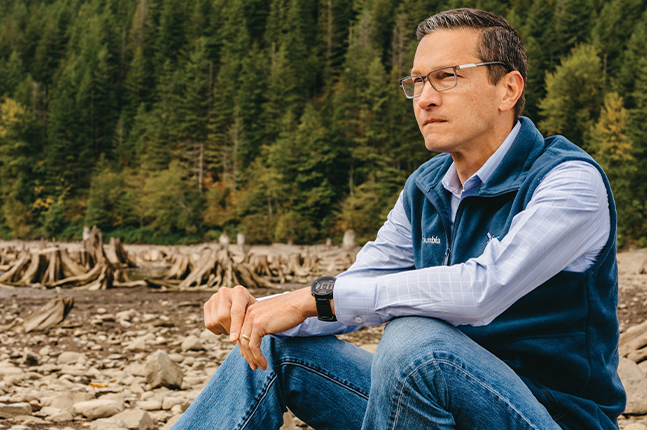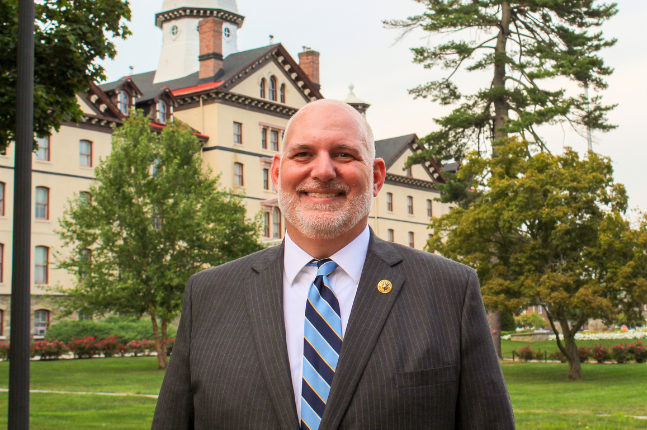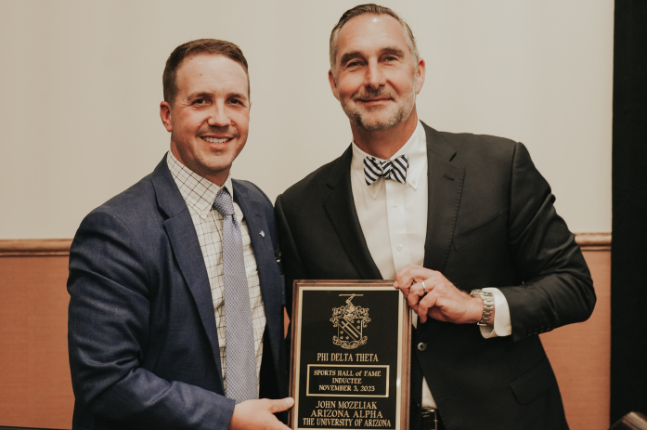General Council President Moe Stephens II on how the Cardinal Principles lead on campus
General Council President Moe Stephens II grew up the youngest of three brothers in an Air Force family that moved many times through his father’s twenty-four-year career. From Oklahoma to Maine, Pennsylvania to Texas, his family found a home wherever they were among the diverse peoples that make up military families. “My 6′ 2″ dad married my 4′ 11″ mom, an immigrant from South Korea who grew up in an orphanage after losing contact with her family during the Korean War. Because Moe’s parents had different ethnic backgrounds, the family enjoyed both cultures’ traditions, foods, celebrations, and communities.
Upon his father’s retirement, finding work was difficult for his parents. Money was very tight, and sadly, due to the inability to pay storage fees, many of their belongings were sold at auction. As a result, they lost family photos and personal belongings, which added to the struggle. This melancholy influenced their decision to return to a small rural community (population 1,500) in Southern Indiana where Moe’s father had grown up. For the first time in their lives, Moe and his two older brothers found themselves the only family in the whole town with parents of different cultural backgrounds. There was no Korean community, and in the 1980s, there weren’t conversations and forums to raise awareness.
His older brothers were both in high school and went straight into military service after graduation. Being in middle school, Moe found sports to be his best entree to acceptance by the community. Basketball frenzy is well known to the Hoosier State.
It was evident to those around the Stephens that they were different from everyone else in town, and Moe always felt like the only one not like everyone else growing up. When asked if bullying was an issue, he recalled a solitary fight in eighth grade when a classmate called him a derogatory name. That angered Stephens like nothing before or since. Back then, people just didn’t talk about these things out loud, so everything was internalized and processed alone.
Indiana was known for its hyper-focus on basketball. Even though Moe was only around 5’4″ in eighth grade, he pursued basketball, playing varsity his junior and senior years. He also played tennis, baseball, and ran track, and was class president his senior year.
When most parents packed out the stands of any Indiana high school gymnasium on basketball game night, his mother stayed home and listened to the games on the radio. When Moe returned home after the game, they always talked about how the game went.
The first time his mother ever attended in person a basketball game was players’ and parents’ recognition night. Later, when Moe asked his mom why she had never come before, she answered, “I always felt like the only one not like everyone else.”
Moe and his brothers were encouraged to study hard and focus on the classroom. “Education was very important to my mom especially, who, because of her difficult childhood, was only able to finish the eighth grade.” However, when Moe realized that he didn’t want to follow in his dad’s and brothers’ footsteps, he was left to navigate the college application process and student loan maze with only the aid of his high school counselor.
He decided to go to the University of Southern Indiana. He intended to play tennis there, but this was the first year of NCAA Clearinghouse (now NCAA Eligibility Center). This company helps determine the academic eligibility and amateurism status for all Division I and Division II student-athletes. Due to the forms and processes not being completed correctly, he was ineligible to play tennis in the first year of college. Looking back, it was that mistake that freed up his time, allowing him to consider joining a fraternity.
Even though he did not participate in fraternity recruitment his first year, he received bids from nearly all men’s groups. In the end, he chose not to accept any. Sometime later, a friend from the Phi Delta Theta Fraternity invited him to a card night. It was while they were playing that he learned of the struggles of the thirteen-man chapter. Due to their small size, they had unpaid dues owed to General Headquarters.
Feeling an affinity for the men that night, Moe saw an opportunity to grow and joined the chapter.
Stephens served as vice president and president and lived in the university-owned house. His chapter worked hard to create stability and help establish a presence on campus. He loved the camaraderie that only comes from living under the same roof with guys from various backgrounds and differing political and social perspectives. Some of his best friends are Phis from that period.
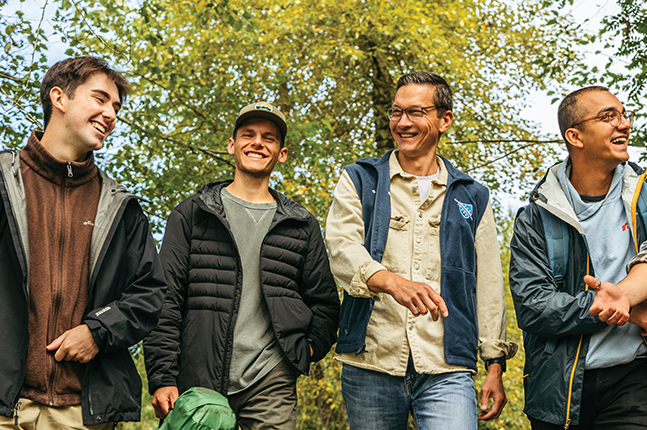
Because Moe was in college in the late 1990s, he and his chapter were faced with the new Alcohol-Free Housing (AFH) policy on his campus and with Indiana Lambda. His chapter was an early adopter of the policy, and he sees it as a key distinguishing factor that Phi Delta Theta had over all other groups on campus. From Stephens’ perspective, AFH was a needed and critical return to the values-based foundation of the Fraternity. It would ensure that the fraternal experience was not only a social interlude but also one of critical thinking, hard choices, conflict resolution, facing down challenges, and coming out stronger on the other side.
He attended what was then called Leadership College (now the Kleberg Emerging Leaders Institute) several times as a participant, then as an ambassador.
After graduating, he joined General Headquarters in an internship, then transitioned to GHQ staff as a leadership consultant, and then as the director of expansion. Moe served for a year and a half before ultimately departing to work at Sacramento State as program coordinator for Greek Affairs. He wasn’t leaving alone, though. After a game of ultimate frisbee among a group of coaches and grad students he’d befriended, he met his future wife, Allison. She was a graduate student at Miami University in College Student Personnel.
After their first date, Allison had done some heavy research on Phi Delta Theta and learned about what Greek life meant since she didn’t participate during her undergraduate experience. Moe laughs saying that he was very impressed with her intensity about learning more and the depth of knowledge of Phi Delta Theta she had gathered from her quick research.
Her support of his service to the Fraternity in volunteer and staff roles, along with their shared vocational experiences in their student and residence life positions, has been necessary through Moe’s eventual election to the General Council in 2013. Their daughter, Maya, who was five when he was first elected, has grown up with Phi Delt. So, the Stephens family is in this together.
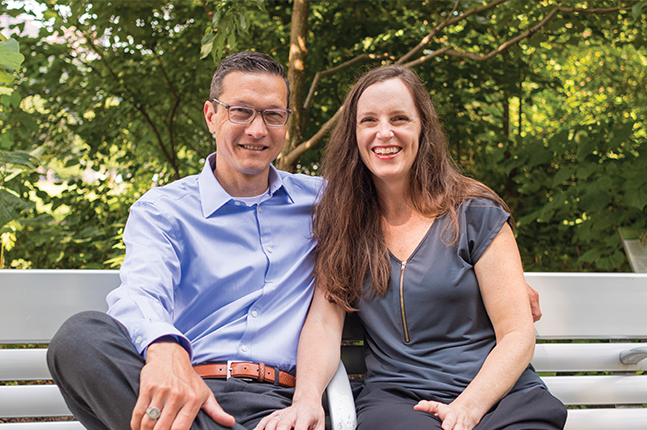
Moe remains an ardent supporter of Greek life and higher education as partners in the educational process of young people, providing a balance of social, leadership, and classroom opportunities. The experience of COVID has taught institutions that though virtual education has a place, nothing replaces the value of the in-person experience. Not only in the classroom but also by participating in organizations that provide stimulating and challenging leadership lessons through community service, living in houses together, running the businesses of a fraternity chapter, and learning how to live with people different from yourself.
In Stephens’ estimation, Phi Delta Theta continues to adapt well to the changing college environment. The organization continues to work with university and college administrators instead of in opposition to them and holds members accountable to the Cardinal Principles and intentions of the Founders. When members are not performing with respect to these values, they are disciplined to mitigate more significant problems down the road. “There will always be a place for Greek life on campuses, to provide and be a part of something bigger. College is so much about life outside of the classroom, and Phi Delta Theta is striving to provide the most premier experience for those who come after us.”
Moe dreams of the day each Phi Delta Theta chapter represents and reflects its college campus population, initiates first-generation students, seeks out students with different cultures, experiences, backgrounds, and provides a melting pot experience within a great organization. Thus, attracting members because of their strengths, and not just based on their shared experiences.
To achieve this goal, he set the tone for the 2021–23 biennium by emphasizing the following priorities for the General Fraternity in his inaugural speech given at the 2021 General Convention in Pittsburgh: (1) fraternity is where we can have hard conversations and differences of opinion, (2) diversity and inclusion will improve us as an organization, and (3) by surrounding ourselves and engaging with people who look different, have different opinions, socioeconomic status, cultural background, political views, communication styles, etc. will serve to make us a better people.
Moe is excited by the potential of the commencement of the First-Generation Student Scholarship initiative. Introduced in fall 2021, the scholarships are groundbreaking in the fraternal world, and they will draw in a population never before exposed to the opportunities of college and Phi Delta Theta. Moe’s diverse background enabled him to transfer to the Fraternity his life’s experiences. The Fraternity allowed him to grow into his potential so that he was able “to transmit the Fraternity to those who may follow after, not only less, but greater than it was transmitted” to him.
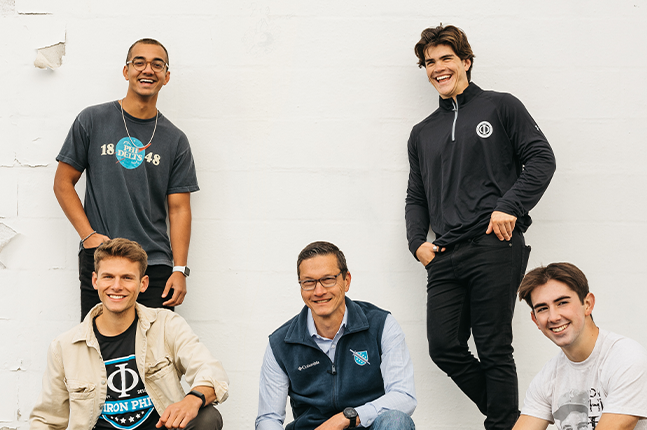
More about Moe
When not working at Puget Sound or with Phi Delta Theta, he and his family love to travel. Introducing their daughter to different cultures, both in the US and around the world, has been a priority when planning family adventures. They also make regular financial contributions to organizations that serve local communities in Myanmar, northern Thailand, and Eswatini. They are currently dreaming about trips to Spain and South Korea!
Moe is a voracious reader and loves many styles of books. One that stands out regarding leadership was called Team of Rivals, and it lays out Abraham Lincoln’s rocky leadership experience, littered with both great and not so great decisions. But through even the hardest of what appears to be a bad decision, he learned from it and became greater. No one is perfect. No one can do it right every time. It’s how you behave after a wrong choice that speaks about the person you are and will become. The decision doesn’t define you but the day after does.
At the University of Puget Sound, he is the director of student activities and was named the AFLV West’s Greek Advisor of the Year in 2005. Moe has also served the Fraternity as the Pi North province president, awards committee chairman, and survey commissioner.

